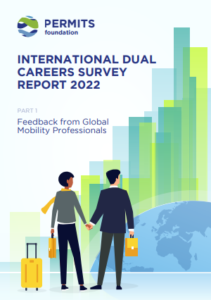INTERNATIONAL
DUAL CAREERS
 SURVEY REPORT
SURVEY REPORT
04 July 2022
Part one of the Permits Foundation international dual careers survey report – feedback from global mobility professionals . The report reflects the views and experiences of participants from both the public and private sectors from October-December 2021, an important period of change. It looks at the importance of partner employment access from the employer perspective as well as current practice in partner support, countries of importance and emerging issues around new ways of working.

Survey confirms that where there is an international assignment, partner employment access has a positive impact on talent attraction and retention, employee experience, diversity, equity, inclusion and the reputation of the host country.
The report concludes:
“In many countries, demographic forecasts point to skills shortages that cannot be met by the local workforce alone and will require foreign talent.
Governments, companies and international organisations need to be fully aware of the effect that barriers to partner employment can have on employee relocation abroad.
Employers would welcome the removal of work permit restrictions for accompanying partners.”
In addition, “for most global mobility professionals, the definition of family members authorised to work directly upon recognition of their dependant status should be broad, covering married and non-married partners and (for half of respondents) working age children.”
Among the findings:
- the overwhelming majority (94%) of respondents said that family members should be authorised to work in the host country directly upon recognition of their dependant status
- US, China and India topped the list of countries where organisations would like to see legislative change to facilitate
partner work access. - in 44% of organisations, employees had returned home early from an international assignment in the past 3 years due to concerns about the partner’s employment.
- 60% of respondents had been asked by international employees about the right of their partner to work virtually.
- 22% of respondents said that the importance of supporting dual careers in the global workplace did not feature at all in their organisation’s DE&I materials, 28% did not know.
- 61% said that dual career and partner issues were becoming more important to their organisation.
Part 2 will be published after the summer; will reflect feedback from spouses and partners of international employees.

